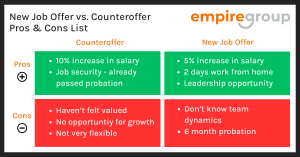How to Navigate a Counteroffer in the Recruitment Process
Being offered a new job can be a scary but exciting process; after going through interview stages and negotiations, you are finally ready to start the next stage of your career. All that’s left to do is resign from your current role.
But what do you do when you are ready to resign and your employer counteroffers you instead? Maybe they’re offering a salary increase or a new job title or better benefits.
Either way, it can halt you in your tracks and make you second guess what the right decision is. Should you start a new job? Or accept your current employer’s counteroffer?
Here is a step-by-step guide for what you should do when you are counteroffered.
Number One: Reflect on your decision making- why are you in this situation?
When counteroffered, it is important to remember the steps that put you in this situation.
Consider, what were things lacking in your current role that caused you to seek a new opportunity?
Were you being paid what you wanted?
Were you being given the developmental opportunities you needed to grow?
Did you have the level of responsibility you wanted in this role?
Is this business the right cultural fit for you?
When navigating a counteroffer, identifying your personal pain points will help you evaluate the offer with clarity and ensure that your decision meets all of your needs.
Number Two: Understand your employer’s reasons for a counteroffer
It can be difficult and not always accurate to speculate on another person’s decision-making process, but considering your employer’s perspective can help you evaluate your counteroffer.
Recruitment can be a difficult and costly process for a business, the best solution for this problem is staff retention. It will cost a business less to give you what you are looking for (like a pay rise or promotion) than it will to employ someone else in your current position.
But similarly, you may also be recognised for adding a lot of value to the business from a cultural and innovative perspective.
Are you being counteroffered because they don’t want to hire someone new, or because your employer believes you leaving would be a genuine loss to the business?
Whilst this answer could remain unclear, it is important to consider when evaluating a counteroffer- how valued has this business made you feel? Is this tied with your desires to change roles?
Consider the actions of your employer, more than their words.
Number Three: Compare the offers objectively
Pros and Cons of Accepting a Counteroffer
Pros and Cons lists are classics for a reason. They are a fast and visual way to compare decisions. When trying to decide between accepting a counteroffer or accepting a new job opportunity, writing down the pros and cons of each can give you a visualisation of your choices.
Here are a few questions to help you fill out your pros and cons list:
- Is this business a cultural fit for you?
- Do you feel that the benefit of the role aligns with your values? For example, if you would like to work from home a few days a week, do these roles offer that? If you are planning to start your family over the next few years, do they have good parental policies?
- Which of these roles offers a better financial package? When considering the financial aspects of a job you may want to compare this to the market salary for this role with your experience. Additionally, you should consider superannuation packages of the roles- are they the same? (Generally, government roles will offer a higher superannuation package for example).
- Will you have an opportunity to develop & grow in these roles?
Once you have built out your pros and cons list, you should have a better idea of which role suits you and your current priorities.
Seek Advice on your Counteroffer
Deciding on what job to take can be a hard decision, but doesn’t have to be one you make on your own. There are many people you should consider consulting through this process.
Your Recruiter
If you have received a new job offer via the help of a recruiter, it is a great idea to talk through your counteroffer with them. Recruiters have a great grasp of the industry and particularly their clients. Raise your concerns with them, and they will be able to give you a clear idea of what to expect.
Additionally, being up front with your recruiter will help your relationship with them in the long term, as they can communicate and advocate for you with their client honestly.
Mentor
Do you have a mentor? Someone who has a similar career progression that you want to take? Often people with more experience can see things that you can’t, so consulting a mentor will help you make an informed decision.
Family & Friends
Your family and friends get to see you outside of work, and may have a perspective to offer that you haven’t considered. If your current workplace impacts your mood at home for example, the ones you love will be able to identify this even if you haven’t.
Making a career decision doesn’t need to be one you make alone, and seeking the advice of people around you can help alleviate the pressure of that choice.
Number Four: Consider your long term career goals and identify which job fits them
What do you want out of your career in the long term? Maybe you see yourself as a manager one day or maybe you want to work on bigger projects within your role.
Of these two jobs, which one gets you closer to that goal? It’s important to always be considering long term goals when making career decisions.
Number Five: What does your intuition say about the counteroffer?
If you reflect on these questions, talk to the people around you, fill out a pros and cons list, and despite what it says on paper don’t feel right about one of the decisions, that’s okay. Only you know what is best for your career and your development, if your instinct is that one decision is right for you, then you should trust that.
Number Six: Make a Decision
Accepting the counteroffer
If your current employer wants to make real change for you in your role by planning to engage and develop you in your career journey it may be the right decision for you to stay. As long as you feel the reasons you wanted to leave are being addressed, accepting a counteroffer can be a great opportunity for your career.
Declining and Rejecting a counteroffer
Not accepting a counteroffer is a normal part of the recruitment process. In fact, our recruiters find that those who do accept a counteroffer will be back on the job market within 12 months.
If you do decide to decline this offer, it is important to maintain professionalism and try and keep the relationships you have built there. Even when taking a new job, the connections you have at your old one can help you with your career later on.
empire group
If you have accepted a counteroffer and come to regret that decision, that’s okay. empire group have a team of expert recruiters who are passionate about assisting the long-term career growth of their candidates. Reach out today to be connecting with one of our great team members who can help you take the next step in your career.
empire group are a specialist recruitment agency with offices in Brisbane, Sydney and Melbourne. We help professionals to advance their careers across legal support jobs, legal professional jobs, technology jobs, corporate jobs, risk and governance jobs, eDiscovery jobs, within both the temporary employment and permanent employment market.
If you are looking to make your next career or business decision reach out to empire group today at 07 3231 1200, or email administration@empiregroup.com.au, or visit: https://www.empiregroup.com.au/contact-us/ to be connected with one of our great recruiters.



